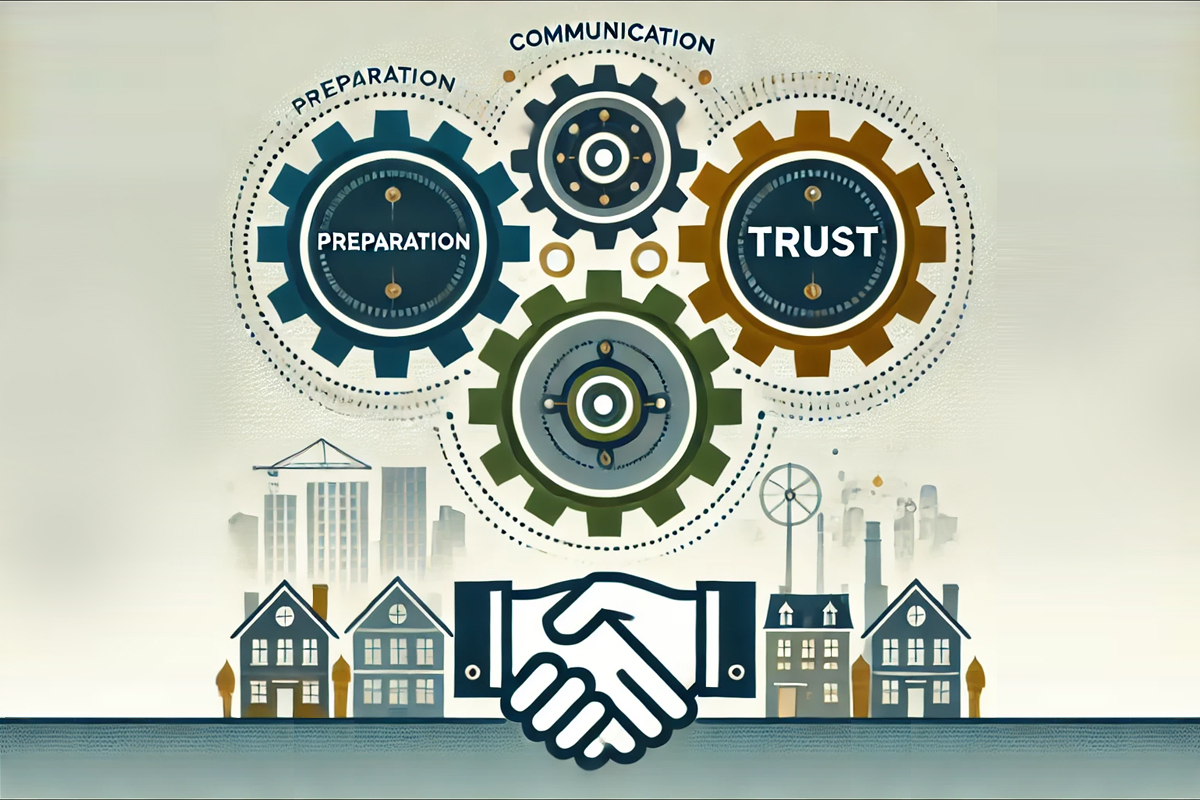
What Are HOA Fees?
Homeowners Association fees are regular payments made by every property owner in a condominium or townhome community. They help cover shared expenses like maintenance, insurance, Read more...
What Are HOA Fees?
Homeowners Association fees are regular payments made by every property owner in a condominium or townhome community. They help cover shared expenses like maintenance, insurance, and the amenities you enjoy, ensuring everyone contributes their fair share. This shared responsibility keeps the property’s appearance, safety, and value consistent, benefiting all residents.
What Do HOA Fees Cover?
Most HOA fees focus on four main areas: maintenance, insurance, amenities, and reserve funds. Let’s break each one down further.
Maintenance
Landscaping: Caring for lawns, bushes, trees, and flowers to keep the community looking fresh and inviting.
Snow Removal: Clearing driveways, walkways, and parking areas during the winter to keep residents safe.
Common Area Cleaning and Repairs: Maintaining hallways, elevators, lobbies, and other shared spaces so everyone enjoys a clean, well-kept environment.
Insurance
A master insurance policy protects the building and common areas against fires, storms, or vandalism damage. While individual homeowners still need personal property insurance (often called an HO-6 policy) to cover belongings and the interior of their units, the HOA’s insurance takes care of the larger structure and shared grounds.
Amenities
Amenities vary, but your HOA fees might cover:
Pool Maintenance: Keeping the pool clean, safe, and ready for use.
Gym Maintenance: Ensuring exercise equipment is well-maintained for convenient, on-site workouts.
Clubhouse Maintenance: Preserving shared gathering spaces for parties, meetings, or community events.
These perks can increase your quality of life and enhance your property’s resale value.
Reserve Funds
A portion of your monthly fee goes into a reserve fund, which acts like a community savings account. It’s used for capital improvements and major repairs, such as replacing the roof or repaving the parking lot. By saving over time, the HOA can handle these larger projects without surprising you with big, last-minute bills, providing financial stability and peace of mind.
How Are HOA Fees Calculated?
Your HOA board creates an operating budget each year. They often conduct a reserve study to predict future maintenance and repair needs, providing a sense of security and preparedness. The HOA ensures fair contributions by estimating the total annual costs and dividing them among all units.
As a homeowner, you have the right to access the HOA’s budget documents and reserve studies, often through the HOA management company’s website or an online portal. This transparency empowers you to understand how your fees are used and ensures community accountability.
High vs. Low HOA Fees: What’s the Difference?
While lower fees might initially seem appealing, it's important to consider the long-term implications. They can sometimes lead to limited maintenance, fewer amenities, and smaller reserve funds. Over time, this can cause deferred maintenance, which may lower your home’s resale value. By being aware of these potential outcomes, you can make an informed decision about your investment.
For instance, let's consider a community in Rancho Cucamonga with low HOA fees of $ 100 per month and a community in Newport Beach with high HOA fees of $ 500 per month.
Scenario A (Low HOA Fees): The fees are low, so the community provides only basic landscaping and minimal exterior upkeep. Amenities are scarce, and repairs are postponed due to limited funds. Over the years, the property’s appearance has suffered, which may reduce its overall value.
Scenario B (High HOA Fees): The fees are higher, enabling the community to maintain beautifully landscaped grounds, conduct regular exterior building maintenance, and offer luxurious amenities such as a resort-style pool and a state-of-the-art fitness center. With well-funded reserves, the HOA can handle significant repairs without issuing special assessments. This ensures that the property remains attractive and can even increase in value over time, providing a sense of security for your investment.When choosing a community, it's crucial to consider what you get in return for the fees. Sometimes, paying more each month means fewer surprises and a more enjoyable living experience. By understanding the role of HOA fees in shaping your living experience, you can make a decision that aligns with your lifestyle and preferences.
Understanding Special Assessments
While the regular budget and reserve funds are crucial, they may not always cover unexpected issues like severe storm damage or sudden major repairs. In such cases, the HOA might issue a special assessment, a one-time fee in addition to your regular dues. This can be seen as a proactive measure to protect your investment and ensure the community's well-being.
Before buying, ask about the community’s history of special assessments.
It’s important to find out how often they’ve occurred and why they were needed. Understanding this can give you insight into how well the HOA plans for the future and handles emergencies.
Why HOA Fees Matter
Property values, community upkeep, curb appeal, and resale value all benefit from a well-funded and well-managed HOA. By paying HOA fees, you actively contribute to keeping common areas attractive, ensuring repairs are done on time, and maintaining amenities that enhance your quality of life and your home’s value. Your fees are not just a financial obligation, but a direct investment in your community's improvement.
These fees aren’t just another bill but an investment in your community’s future. With substantial financial planning, the HOA can keep your property looking great, making it a place you’re proud to call home. By understanding and being part of this planning, you can feel more empowered and informed about your community's future.
HOA fees (condo fees or HOA dues) are essential to condo or townhome ownership, and your role in understanding them is crucial. They pay for upkeep, insurance, amenities, and future repairs that keep your property safe, comfortable, and visually appealing. By taking time to understand the HOA’s budget, reserve funds, and history of special assessments, you can make a well-informed decision, knowing that your input is valuable.
If you’re still exploring your housing options, remember there’s a difference between condos and apartments. Equipped with this knowledge, you can feel confident you’re making the right choice for your lifestyle, budget, and long-term investment.
Love,
Kartik
|

Searching for the perfect place to call home can feel overwhelming, especially when you’re faced with a choice between condos and apartments. Both can offer comfortable living spaces and attractive Read more...
Searching for the perfect place to call home can feel overwhelming, especially when you’re faced with a choice between condos and apartments. Both can offer comfortable living spaces and attractive amenities, but they provide very different experiences. By understanding how they differ in ownership, costs, responsibilities, and lifestyle, you can decide which option is the best fit for you.
Defining Condos and Apartments
An apartment is a unit you rent in a building owned by a landlord, who could be a company, investment group or even an individual. When you rent an apartment, you don’t own the property and must follow the landlord’s rules.
A condo is a unit you own within a larger building or community. You’re responsible for maintaining your individual unit, while you and the other owners share the upkeep and costs of common areas—like hallways, lobbies, and fitness centers—through a homeowners association (HOA). You are also subject to the rules of the HOA.
Regional Variations
Keep in mind that condos and apartments can vary depending on where you live. Different cities and states have their own rules and customs about tenant rights, condo associations, and typical amenities. Before you choose, do some research on local laws, common fees, and the general housing market in your area.
Ownership: The Core Difference
Apartments: You pay rent to live in a space you do not own. The landlord makes key decisions about maintenance, upgrades, and rules.
Condos: You own your unit and share common areas with other owners. You have more decision-making power through the HOA, but must also follow the HOA’s rules and pay fees.
Responsibilities: Who Takes Care of What?
Apartments: The landlord usually handles repairs and maintenance. If something breaks, you call them to fix it.
Condos: Condo owners are responsible for repairs inside their unit. If something breaks, it’s your job to hire someone to fix it. The HOA often maintains common areas, handles larger building issues, and pays for those with the monthly fees collected from owners.
Costs: Rent vs. Mortgage, Taxes, and Fees
Apartments: You pay monthly rent, which may increase when you renew your lease. You might also have extra charges for parking or pets.
Condos: Owning a condo often means paying a mortgage, property taxes, and monthly HOA fees. The fees paid to the HOA funds insurance for common areas, building maintenance, and amenities. Sometimes, if the building needs a major repair—like a new roof—owners may have to pay a special assessment fee in the event there aren’t adequate reserves to pay for the item.
Insurance Considerations
Apartments: Renters typically need renter’s insurance, which is usually low-cost and covers personal belongings.
Condos: Owners need a homeowners insurance policy (often called an HO-6 policy) for the inside of their unit. The HOA’s master policy may cover the building’s exterior and shared areas. It’s important to understand what the HOA’s insurance covers so you know what your responsibilities are.
Amenities and Management
Apartments: Amenities, such as pools or fitness centers, are managed by the landlord or property management company. Renters have little say in how these spaces are run.
Condos: Amenities are managed by the HOA, which is made up of owners. This gives you a voice in how the building is maintained but also makes you partly responsible for its upkeep and improvement.
Lifestyle Considerations and Condo Association Dynamics: Flexibility vs. Stability
Apartments: Renting offers flexibility. When your lease is up, you can move easily without having to sell anything. However, you don’t build equity, and rent can increase over time.
Condos: Owning a condo can provide more stability and the chance to build equity if the property’s value rises. Still, selling a condo takes more effort than ending a lease, and you must follow HOA rules. These rules are outlined in documents like bylaws and CC&Rs (Covenants, Conditions, and Restrictions), and they can affect things like whether you can have pets, how you decorate, and where you park. As an owner, you can attend HOA meetings and vote on important matters like repairs, fee changes, or updates to common areas.
A well-managed HOA can help preserve or even boost a condo’s value by keeping the building in good shape and maintaining a healthy financial reserve. On the other hand, a poorly run HOA can lead to neglected maintenance, higher fees, and conflicts among owners, which can hurt property values. This means that while there’s potential for your condo to appreciate over time, there’s also the risk of depreciation if the building isn’t managed well.
Making the Right Choice
When choosing between a condo and an apartment, consider:
Do you prefer flexibility, or are you looking for long-term stability and equity building?
Can you handle the costs of a mortgage, property taxes, and HOA fees?
Are you comfortable following HOA rules and taking part in building decisions?
How long do you plan to live in this home?
By weighing these factors and researching local conditions, you’ll be better prepared to pick the option that fits your lifestyle, budget, and future goals.
If you're unsure whether condo ownership is right for you, consider attending informational sessions or workshops offered by a local real estate school. They can provide valuable insights and help you make an informed decision.
|

Imagine listing a home and it sitting on the market for months, or worse, selling it for far less than it's worth.
The key to avoiding these pitfalls? A Comparative Market Analysis (CMA).
Read more...
Imagine listing a home and it sitting on the market for months, or worse, selling it for far less than it's worth.
The key to avoiding these pitfalls? A Comparative Market Analysis (CMA).
Understanding a home's true market value is crucial when buying or selling a home. A CMA is a detailed report used by real estate professionals to determine a property's fair market value based on current market conditions and recent sales of comparable properties.
What Is a CMA and Why Is It Important?
A CMA is a data-driven approach to pricing a home, ensuring it's neither overpriced nor underpriced. An accurate asking price not only attracts serious buyers but also empowers buyers to make informed offers, giving them a sense of control. A CMA removes much of the guesswork from home valuation by using up-to-date data, instilling confidence in both parties.
How Do Real Estate Professionals Use CMAs?
Agents use CMAs to guide clients in making strategic decisions, providing them with professional guidance and reassurance. For sellers, a CMA helps determine the optimal listing price. For buyers, it ensures they don't overpay. Agents typically gain CMA expertise through real estate education and training, further enhancing their strategic role.
The Steps Involved in Creating a CMA
Here's a breakdown of the CMA process:
Identify the Subject Property: Agents gather details about the property, including size, bedrooms, bathrooms, amenities, condition, style, and unique features. They also consider the neighborhood, schools, and nearby amenities.
Select Comparable Properties ("Comps"): Agents choose "comps"—similar properties based on location, size, condition, style, and age. These are typically sourced from the Multiple Listing Service (MLS) and should ideally have sold within the last three to six months and be located near the subject property.
Adjust for Differences: Since no two homes are identical, agents adjust the prices of comps to reflect the subject property's value. This involves adding or subtracting value based on key differences.
Analyze Market Conditions: Agents consider current market conditions, including supply and demand, interest rates, and economic trends. This step is crucial in the CMA process as it provides a broader understanding of the real estate landscape, making the audience feel more informed.
Review the Data and Present the Findings: The agent creates a report summarizing the comps, adjustments, and conclusions, which are presented clearly to the client.
Adjust for Differences: A Closer Look
This crucial step involves adjusting comp prices to account for differences from the subject property. Here are some examples:
Size: If a comp is 100 square feet smaller, and a similar space is valued at $100/sq ft, the agent adds $10,000.
Bedrooms/Bathrooms: Based on local market data, an extra bathroom might cost $5,000- $10,000.
Garage/Parking: A two-car garage is typically worth more than a one-car garage or street parking (e.g., $5,000-$10,000).
Updates/Renovations: A renovated kitchen adds value; an outdated kitchen in the subject property compared to a renovated one in a comp might result in a deduction.
Lot Size/Location: A more considerable or desirable location (e.g., corner lot) can increase value.
Using consistent, market-based adjustment values is essential for accuracy.
Analyzing Market Conditions
Beyond individual property features, market conditions play a significant role.
Agents consider:
Absorption Rate: How quickly homes are selling.
Days on Market (DOM): The average time for selling homes.
Inventory Levels: The number of homes for sale.
Seasonal Trends: Market changes throughout the year.
Interest Rates: Affect buyer affordability and demand.
The Role of Technology in CMAs
Modern CMAs leverage technology:
MLS Data: Direct access to comprehensive sales data.
CMA Software: Streamlines data analysis and report generation.
Automated Valuation Models (AVMs): While useful for quick estimates, AVMs lack the nuanced analysis of a CMA performed by an agent.
Benefits of a CMA
For Sellers: A data-backed listing price attracts buyers and reduces time on the market.
For Buyers: Confidence in making fair offers and more vigorous negotiation.
Common Questions About CMAs
Is a CMA the same as an appraisal? No. An appraisal is a formal valuation by a licensed appraiser, often required by lenders. A CMA is a less formal estimate by a real estate professional.
Can a CMA guarantee a sale price? While a CMA provides a strong indication of market value, the final sale price depends on various factors, including negotiation and market fluctuations.
Making Informed Real Estate Decisions
A CMA is an essential tool for informed real estate decisions. A CMA provides a clear picture of a home's fair market value by analyzing comparable properties, adjusting for differences, and factoring in market conditions.
Love,
Kartik
|
Want to be a top-performing real estate agent? Then you need to go
beyond the basics of real estate license school and understand the
practical roles of home inspectors, appraisers, and title officers.
Mastering Read more...
Want to be a top-performing real estate agent? Then you need to go
beyond the basics of real estate license school and understand the
practical roles of home inspectors, appraisers, and title officers.
Mastering these collaborations is the key to smoother transactions,
happier clients, and a str
|

Real estate can be a powerful tool for building wealth throughout your career. As a real estate professional, you possess unique knowledge about properties and markets, giving you a distinct advantage Read more...
Real estate can be a powerful tool for building wealth throughout your career. As a real estate professional, you possess unique knowledge about properties and markets, giving you a distinct advantage when investing and planning for retirement. With a solid education—often starting at a reputable real estate school—you can transform your day-to-day job into a long-lasting financial foundation, empowering you to take control of your financial future.
Why Real Estate Helps You Build Wealth
Real estate provides a valuable physical asset that usually gains value over time. Unlike stocks, which can rise or fall quickly in the short term, property values often hold steady and even appreciate. As a Realtor, you know how to read market cycles and identify neighborhoods on the rise. Over time, the income you earn from rents and the increase in property value can create a steady path to long-term wealth.
Looking for the Right Opportunities
Choosing the right property at the right time is one of the most critical steps. Focus on neighborhoods that show growth, such as new jobs, improved transportation, and better schools. For example, consider a once-overlooked area where a new tech company is opening offices, and more people want to live there. With your training in real estate school, you can read these signals before others catch on.
Key Things to Consider When Selecting a Property:
Location and Growth Potential: Look for places with strong job markets and upcoming infrastructure projects.
Property Condition: Check that the building is in good shape. If it needs major repairs, factor those costs into your plans.
Cash Flow Potential: Consider how much rent you can collect after expenses. You want a property that generates more income than it costs to maintain.
Facing the Realities of Investing
While real estate can help you build wealth, it’s not always easy. Rental properties can sit empty for months, leaving you with no income. You might have tenants who don’t pay on time or cause expensive damage. Unexpected repairs, like a broken furnace or leaky roof, can happen at the worst possible time and cost you thousands of dollars. It’s essential to be prepared for these challenges. That means setting aside some extra money, being ready to screen tenants carefully, and responding quickly to maintenance issues.
Building a Diverse Portfolio
Just like you wouldn’t invest all your money in one stock, don’t put all your real estate investments into one property type. Diversify by owning different kinds of real estate:
Residential Rentals: Single-family homes or small apartment buildings often have steady demand.
Multi-Family Properties: Larger apartment complexes can create multiple income streams from one investment.
Commercial Properties can include offices, retail stores, or warehouses. They may offer higher returns but require more work to manage or lease out.
Short-Term Rentals: Vacation homes or properties aimed at traveling professionals can bring in high rents, but these might have more turnover and require more active management.
Overcoming the Capital Hurdle
Accessing the money to invest in real estate can take time and effort. Approval for a mortgage often requires a strong credit history, reliable income, and enough savings for a down payment. For beginners, it may seem like a big hurdle. However, by saving carefully, improving your credit score, and partnering with other investors, you can find ways to break into the market. It might mean starting with a smaller or more affordable property and working your way up over time.
Smart Use of Financing
When you qualify for a loan, using it wisely can help you grow. A mortgage can allow you to buy a property with less money upfront. As tenants pay rent, they help cover your loan, building your equity. Equity is the difference between the market value of your property and the amount you owe on the mortgage. As your tenants pay rent and your property appreciates, your equity grows. Just remember not to take on more debt than you can handle. Too many loans can backfire if rents drop or you face costly repairs.
Real-World Examples Make It Real
For instance, consider a Realtor named Sarah who starts small by buying a two-bedroom condo in a growing part of town. The mortgage and fees are manageable, and she quickly finds a responsible tenant. After a few years of steady rent payments and rising home values, she uses her equity to buy a duplex in another promising neighborhood. Over time, as rents go up and the properties appreciate, Sarah earns enough to reinvest and grow her portfolio, eventually retiring comfortably with several income-producing assets. Her journey is a testament to the rewards of making wise investment decisions, leaving her with a sense of pride and satisfaction.
On the other hand, consider David, who jumps into an expensive commercial property in a hot market and needs more research. He needs help finding quality tenants, dealing with unexpected roof repairs, and facing long vacancy periods. His experience shows why it’s essential to understand the risks, have extra cash on hand, and remain patient, even in a strong market. This emphasis on patience can reassure you that challenges are part of the journey, and with the right approach, they can be overcome.
Keeping Up with Maintenance and Management
Once you own property, you have to keep it well-maintained. This doesn’t just keep your tenants happy—it also protects your investment. Taking care of repairs quickly and screening tenants carefully can reduce vacancies and avoid more considerable costs.
Scaling Up and Timing the Market
As you gain experience, you can sell some properties and use the profits to buy others with better potential. For example, selling a house with increased value might give you enough money to buy two smaller homes in a new, up-and-coming neighborhood. Your continued education in real estate will help you recognize these opportunities.
Balancing Real Estate With Other Investments
While real estate is a great cornerstone, it shouldn’t be your only investment. Keeping some money in stocks, bonds, or savings accounts can help you endure tough times. For example, if the real estate market slows down, you can still rely on other investments to carry you through. It’s also wise to set up traditional retirement accounts like IRAs or 401(k)s.
Leaving a Legacy
Real estate wealth can last beyond your lifetime. You can pass properties on to your children without major headaches by setting up proper legal arrangements, such as trusts. This way, your family can continue to benefit from the wealth you worked so hard to create. The properties you can pass on include residential properties, commercial properties, and even vacation homes, depending on your preferences and the needs of your heirs.
Continuing Your Education
The most successful investors always continue learning. Laws change, interest rates shift, and new technologies appear. You can stay on top of these changes by taking classes at a real estate school, or attending workshops. This helps you make better decisions and keep growing your wealth.
For real estate professionals, owning property is more than a paycheck—it’s a long-term strategy. Although it can be complex and comes with risks like vacancies, tough tenants, and repair surprises, the potential rewards are enormous. Just remember that building wealth in real estate often takes patience, careful planning, and a willingness to learn from your successes and mistakes. With the proper education, a solid financial plan, and an open mind, you can turn your everyday work into a secure future that lasts for decades.
Love,
Kartik
|

Real estate is about more than just property. It's about people—where they come from, what they value, and how they choose to live. As a real estate agent, you will meet clients from all different backgrounds. Read more...
Real estate is about more than just property. It's about people—where they come from, what they value, and how they choose to live. As a real estate agent, you will meet clients from all different backgrounds. Some may celebrate holidays you've never heard of, speak languages you don't know, or follow traditions that might seem unusual to you. Understanding, respecting, and working with these differences is called "cultural competency." It's a skill that helps you connect with clients more profoundly, making them feel valued and understood.
In today's world, learning to meet clients' needs from many cultures isn't just a "nice to have"; it's necessary. Communities are becoming more diverse, and buyers, sellers, and investors come from all over. When you master cultural competency, you can reach more clients, handle issues more smoothly, and build a better brand for yourself. More importantly, you'll create a reputation as genuinely caring about the people you serve—not just about making a sale.
Why Cultural Competency Matters
Imagine working with a family who just moved to your area. They may be still learning the local language or have customs that affect what kind of home they want to buy. For example, some cultures prefer multi-generational households, where grandparents, parents, and children live under one roof. Others place special importance on facing specific directions for good luck or having a space for certain religious practices. If you don't understand these needs, you might push them toward homes that don't make sense for their lifestyle, causing confusion or frustration.
Cultural competency is more than just avoiding mistakes; it's about actively building trust with clients from diverse backgrounds. When you demonstrate respect for their traditions and values, and show genuine interest in their unique needs, clients feel valued and understood. This fosters open communication, allowing them to comfortably share their concerns and goals, which ultimately leads to finding the perfect property faster. This trust translates to happy clients, increased referrals, and a thriving business built on strong relationships.
Common Cultural Differences in Real Estate
One of the first things you may notice when working with clients from different cultural backgrounds is that communication styles vary. Some clients may be straightforward, saying precisely what they mean. Others may prefer a more indirect style, using hints or polite phrases rather than giving a straight answer. Understanding these differences helps you avoid misunderstandings. You also learn to read between the lines and pick up on body language cues.
Another difference may be in the decision-making process. In some cultures, buying a home is an individual choice. The client may act alone based on their personal needs. In other cultures, it might be a family decision that involves input from parents, grandparents, or even older siblings. Being aware of who influences the decision can help you guide conversations and show respect to everyone involved.
Cultural differences also appear in how holidays and special events are treated. While some buyers may not mind scheduling showings during significant holidays, others may find that disrespectful. Some families may have specific days they consider lucky or unlucky. By knowing about these customs, you can schedule showings, open houses, and meetings at times that respect their traditions.
Overcoming Language Barriers
Clear communication is crucial when working with diverse clients. While learning basic greetings in their language shows respect, translation apps and interpreters can bridge larger language gaps. Focus on clear, simple language, patience, and positive non-verbal cues to ensure understanding and build rapport.
Building Trust Through Cultural Awareness
Respecting cultural differences isn't just about language or traditions—it's about showing that you recognize each client as unique. When clients see that you are trying to understand their world, they feel safer and more comfortable. Maybe you learn about their festival traditions and avoid scheduling meetings on those special days. Or perhaps you ask them about the features they value most in a home and then listen closely to their answers rather than assuming what they want based on your own experiences.
Small gestures can make a significant difference in building trust. If a client prefers no shoes inside the home, kindly remove yours before entering. If another client has dietary restrictions and you offer refreshments at an open house, consider serving beverages or snacks they can enjoy. While seemingly minor, these actions send a strong message that you care about their comfort and can go a long way in building a strong client-agent relationship.
Over time, this level of respect can lead to deep trust. Clients who trust you are likely to follow your advice, open up about their needs, and feel confident that you have their best interests at heart. In a field like real estate—where the stakes are high—trust can be the difference between a smooth transaction and a deal that falls apart.
Practical Steps to Improve Your Cultural Competency
Becoming culturally competent is a journey, not a destination. It's a process that requires patience, dedication, and a genuine desire to learn. One of the best ways to start is by educating yourself. Read books about different cultures, watch documentaries that explain certain traditions or beliefs, and consider attending cultural fairs or community events where you can meet people from diverse backgrounds and learn firsthand about their customs. Remember, the more you know, the better you can serve your clients.
If your clients come from a particular cultural group, consider learning a few key phrases in their language. For instance, if your clients are Spanish-speaking, learning how to say 'hello' ('hola '), 'thank you' ('gracias '), and 'goodbye' ('adiós ') can go a long way. It shows effort even if you only know a few basic phrases. Look into language classes at a local community center or try an online course. Another idea is to seek mentorship from another agent with experience working with multicultural clients. They can share their successes, mistakes, and strategies.
In addition, feel free to ask clients what makes them most comfortable. If you need help respecting a particular tradition, politely ask them for guidance. Most people appreciate honest curiosity and the chance to explain their customs. Over time, you'll build a mental library of knowledge and experiences that make you a more effective agent.
Long-Term Benefits for Agents and Communities
Cultural competency helps you stand out as a real estate agent and make more sales because you can serve a broader range of clients. This can lead to more referrals and repeat business. It also helps your reputation, as people describe you as understanding, caring, and respectful. These qualities go a long way in an industry built on relationships.
On a larger scale, culturally competent agents help create stronger communities. When people feel accepted and understood, they are more likely to invest in their neighborhoods, build lasting friendships with neighbors, and contribute to the area's growth. By helping clients find homes where they feel comfortable and respected, you're also helping build a positive community environment.
This skill takes time to develop. You might make mistakes along the way or need help with what to do. But with patience, a willingness to learn, and an open mind, you can become the kind of agent clients trust with one of the most significant decisions of their lives. Over time, cultural competency will not only improve your business; it will also help create more welcoming and understanding communities.
Love,
Kartik
|

For many real estate professionals, becoming self-employed brings greater freedom and flexibility. However, it also means you must take control of your retirement planning. Without an employer Read more...
For many real estate professionals, becoming self-employed brings greater freedom and flexibility. However, it also means you must take control of your retirement planning. Without an employer to set up benefits, choosing the correct accounts, making contributions, and selecting proper investments is up to you. You can build a strong financial future by understanding your options and staying organized.
Understanding Your Retirement Account Options
As a self-employed Realtor, you have the power to choose from several tax-advantaged retirement accounts. Whether you’re just finishing real estate school or have years of experience, understanding the basics of each account type empowers you to make the right decisions for your business and your future.
Shared Retirement Accounts for Realtors:
Traditional IRA:
Contributions may be tax-deductible.
Money grows tax-deferred until withdrawn, usually starting at retirement age.
The annual contribution limit in 2024 is $7,000 if you’re under 50 and $8,000 if you’re 50 or older.* Please verify on the IRS website.
Roth IRA:
Contributions are made with after-tax dollars.
Withdrawals in retirement are usually tax-free if rules are followed.
The annual contribution limit for 2024 is also $7,000 (under 50) and $8,000 (50 or older), but income limits apply.*
Solo 401(k):
Designed for self-employed individuals with no employees (other than a spouse).
Higher contribution limits than IRAs. For 2024, you can contribute up to $23,000 as an employee if you’re under 50, plus an employer contribution that can bring the total to around $66,000.*
Offers Roth contributions inside the plan if allowed by the provider.
You may allow loans from your account (subject to specific rules).
SEP IRA (Simplified Employee Pension IRA):
Employer (you) makes contributions for yourself and any eligible employees.
Contributions are a percentage of each employee’s pay and must be the same for all eligible employees.
For 2024, contributions can be up to 25% of your net self-employment income, up to a maximum of $66,000.*
*Note: These limits can change yearly. Always check the latest rules on the IRS website.
Choosing the Right Account for Your Situation
The best retirement account for you depends on your income level, tax strategy, and whether you have employees. For instance, if you anticipate being in a higher tax bracket in the future, a Roth IRA’s tax-free retirement withdrawals might be appealing. If you aim to reduce your taxable income now, a Traditional IRA or a Solo 401(k) might be more suitable.
Always check with a financial advisor or tax planner before making decisions.
Key Considerations:
Current vs. Future Tax Brackets:
If you believe taxes will be higher later, choosing a Roth option could help you avoid hefty tax bills in retirement.
Contribution Limits:
Solo 401(k)s often let you contribute much more than IRAs. If you earn enough, this could help you save more aggressively.
Employees and Business Growth:
A SEP IRA might be more straightforward if you have or plan to have employees. Remember that you must contribute the same percentage for everyone, which can get expensive as you add staff.
Maximizing Contributions
Try to contribute as much as you can. Over time, even small increases can make a big difference due to compounding growth. Set up automatic transfers so you don’t forget to invest. Keep track of changing contribution limits each year—these are usually adjusted for inflation.
Diving Deeper into Solo 401(k)s
A Solo 401(k) stands out because of its high contribution limits and flexibility. Beyond your contributions, you can often include Roth funds inside the plan, giving you tax-free growth on that portion. Some Solo 401(k) plans also let you borrow from your balance, which can be helpful in emergencies, though it’s generally best to leave your retirement money invested long-term.
SEP IRAs and Employee Contributions
A SEP IRA can make contributions straightforward if you own a real estate business with employees. You contribute a set percentage of each person’s compensation, including yours. While this keeps the plan fair, you must consider the total cost if you have multiple employees.
The calculation is based on your net self-employment income, and it’s wise to talk to a tax professional to ensure you’re following the rules correctly.
Making Smart Investment Choices
Once you’ve selected your retirement accounts, the next step is to decide how to invest your funds. While it might be tempting to focus solely on real estate-related investments, it’s generally safer to diversify your portfolio across different types of assets.
Suggested Investment Mix:
Low-Cost Index Funds: Cover broad parts of the market at a low fee.
Target-Date Funds: Adjust your investment mix as you approach retirement, making them easy “set-it-and-forget-it” options.
Blue-Chip Stocks: Shares in well-established companies.
Bonds: Help balance the risk of stocks and add stability.
Real Estate Investment Trusts (REITs): Offer a way to invest in real estate without directly owning property.
Cash or Money Market Funds: Provide liquidity for emergencies and short-term needs.
Real Estate Investments Inside Retirement Accounts
You may be interested in holding real estate or related assets inside retirement accounts as a Realtor. This can be done through self-directed IRAs or specific Solo 401(k) plans. But be careful:
Prohibited Transactions: The IRS has strict rules about using retirement funds for real estate. For example, you generally can’t use your IRA-owned property for personal use or manage it yourself without following specific guidelines.
Complexity and Expenses: Setting up a self-directed IRA to invest in actual properties can be complicated and may incur extra fees. Before going this route, make sure you understand all the rules and possible penalties.
Tax Benefits and Future Withdrawals
The main advantage of these accounts is their tax treatment. Traditional IRAs and 401(k)s offer tax-deferred growth, meaning you don’t pay taxes until you take the money out in retirement. Roth accounts grow tax-free, so while you pay taxes now, you can skip them later. The idea behind a Roth IRA is to pay taxes upfront while you're likely in a lower tax bracket, so you can enjoy tax-free withdrawals later in retirement when you might be in a higher tax bracket.
Don’t forget that many accounts have Required Minimum Distributions (RMDs) starting at a certain age. Failing to take RMDs can lead to hefty penalties, so plan.
Education and Professional Help
Your real estate background and training help you understand market trends and make informed investing decisions. Still, consider working with a financial advisor or tax professional specializing in helping Realtors. Their guidance and what you’ve learned from real estate school and industry experience can keep you on track.
Regular Reviews and Adjustments
Review your retirement strategy at least once a year. As your income, business structure, and personal goals change, you might need to adjust your contributions, try different investments, or switch account types. Staying flexible ensures that your retirement plan grows with you.
By choosing the correct accounts, maximizing your contributions, selecting suitable investments, and following the rules carefully, you can create a retirement plan that will support you well after you’ve closed your last deal.
Love,
Kartik
|

As a newly licensed Realtor fresh out of real estate school, you’re stepping into a world brimming with opportunity. While early career success often focuses on growing your client base, closing Read more...
As a newly licensed Realtor fresh out of real estate school, you’re stepping into a world brimming with opportunity. While early career success often focuses on growing your client base, closing your first few deals, and establishing credibility, it’s equally important to consider your long-term financial health. Strong financial planning for Realtors isn’t just about the here and now—it’s about setting the stage for a comfortable and secure retirement.
Establishing the Right Mindset from Day One
The excitement of starting your career can overshadow thoughts of the future. However, integrating retirement strategies for real estate professionals into your routine from the very beginning can pay off exponentially. By setting aside funds early and often, you’ll leverage decades of compounding growth, ensuring you have a robust nest egg when the time comes to slow down.
Why Start Saving Early?
Compounding Returns: The sooner you invest, the longer your money has to grow. Even modest monthly contributions can accumulate into significant sums over 20 or 30 years.
Market Volatility Cushion: By starting early, you have time to ride out market dips and fluctuations without derailing your long-term plans.
Building Confidence: Having a dedicated retirement account, diversified investments, and a long-term perspective will ease stress and guide better decision-making.
Understanding Market Cycles and Influences
A crucial aspect of financial planning for Realtors is understanding how market cycles affect both your commissions and your investments. Knowledge gained from attending a reputable real estate school helps you anticipate market shifts, enabling you to position your investments accordingly. For instance, during a seller’s market, you might focus on maximizing commissions to boost your savings, while a buyer’s market may create opportunities for acquiring investment properties at attractive prices.
Balancing Earned Income with Investment Income
As a Realtor, your earned income derives directly from your sales commissions. While this can be lucrative, it’s also cyclical. Diversifying your income streams is essential, and real estate investment tips can help you strategically acquire rental properties or other assets that generate passive income. Over time, these investments can reduce your reliance on transactional commissions and help stabilize your earnings.
Actionable Steps for Early-Career Realtors
Automate Savings: Set up automatic transfers from your checking account to a retirement account every month.
Budget Rigorously: Track your expenses, identify areas to cut back, and allocate the freed-up funds to investments.
Seek Professional Guidance: A financial advisor or CPA who understands the unique challenges of your career can help tailor your plan.
Invest in Education: Regularly refresh your skills through real estate school courses to stay informed about market trends and best practices, enhancing both your sales abilities and investment acumen.
Crafting a Long-Term Investment Strategy
When building a long-term portfolio, consider blending stable, income-generating investments like rental properties with growth-oriented assets such as stocks or REITs. This balanced approach helps mitigate risk and ensures consistent returns. By incorporating retirement strategies for real estate professionals that leverage your industry knowledge, you gain a competitive advantage, picking properties that align with long-term market projections.
Building a Strong Client Base and Referral Network
While not directly related to retirement, having a loyal clientele and a solid referral network can indirectly support your financial stability. A robust pipeline ensures steady commissions, reducing the pressure to make reactive financial decisions. This consistent income stream allows you to systematically invest and grow your retirement funds over time.
The Role of Real Estate School in Financial Planning
A well-respected real estate school like ADHI Schools offers more than just licensing preparation. It can provide advanced training on industry dynamics, investment analysis, and negotiation skills. Armed with this knowledge, you can identify undervalued properties, negotiate favorable terms, and time your market entries and exits efficiently—all of which contribute to a stronger retirement portfolio.
Adjusting as Your Career Evolves
Your financial goals will evolve alongside your career. As you gain experience and close more deals, your savings capacity may grow. Reassess your retirement strategy periodically, and consider increasing monthly contributions, adjusting asset allocations, or adding new investment vehicles. Continuously refine your approach to maintain alignment with your changing professional and personal circumstances.
Keeping the End Goal in Sight
Financial planning for Realtors goes beyond dollars and cents. It’s about ensuring that after decades of hard work, you can enjoy a comfortable retirement without financial stress. By starting early, learning continuously at a quality real estate school, and making informed, disciplined choices, you’ll pave a path to lasting security—ensuring that your future self will thank you for the smart decisions you made today.
Love,
Kartik
|

As an agent, you spend much of your time analyzing sales data, advising clients, and networking to uncover hidden deals. You understand how every piece of a transaction impacts a buyer’s bottom line. Read more...
As an agent, you spend much of your time analyzing sales data, advising clients, and networking to uncover hidden deals. You understand how every piece of a transaction impacts a buyer’s bottom line. Yet many agents forget to leverage these advantages when purchasing their homes. By representing yourself, you tap into exclusive resources like the Multiple Listing Service (MLS), have the ability to apply your negotiation expertise directly, and even earn the buyer’s side of the commission. But you’ll also need to remain objective—sometimes easier said than done—and work closely with your brokerage to ensure a smooth process.
Unlocking the Power of the MLS
Your first major advantage as a real estate professional is your direct access to the MLS. Unlike public-facing sites, the MLS offers comprehensive, up-to-the minute information on available properties.
Exclusive and Pre-Market Listings: You can learn about “coming soon” properties and other MLS statuses that never appear on the popular real estate portals. This early access allows you to submit offers before a surge of interest.
Brokerage Variations: Some brokerages provide different commission splits to their sales staff when they buy their own home. Know your brokerage’s policies to get the most out of the system.
Real-Time Updates: The MLS refreshes listings more quickly than general real estate platforms. By staying on top of these updates, you can move fast in competitive markets and gain an edge over other buyers.
By using the MLS to its full potential, you can uncover properties the public doesn’t even know about—often leading to less competition and potentially better deals.
Working with Your Brokerage
Before you dive headfirst into self-representation, it’s wise to have a conversation with your broker. Establishing clear expectations and understanding all office policies upfront can prevent misunderstandings later.
Commission Splits: As mentioned, confirm your office's commission policy for self-representation. Some brokerages let you keep most (or all) of the buyer’s agent commission, while others require a standard split.
Broker Support: Make sure your broker fully supports your plan. An ally in the office can help you navigate administrative or compliance-related hurdles.
Legal and Ethical Guidelines: Even if you act as a buyer and agent, you must follow all licensing laws, ethical rules, and local regulations—Double-check before making an offer, double-check office guidelines regarding disclosures, escrow processes, and contracts.
Having these details worked out ahead of time can prevent potential conflicts down the road and ensure that you remain on good terms with your brokerage.
Market Mastery: Navigating Trends and Pricing
Your experience analyzing market trends, comparable sales, and property data is one of your most valuable assets. Applying this insight to your purchase can help you spot undervalued homes and avoid overpaying.
Neighborhood Patterns: You know which neighborhoods are up-and-coming or experiencing price reductions. Buying in a neighborhood on the rise can lead to increased equity over time.
Data-Driven Comparables: Rather than relying on general online estimates, you can analyze the exact sale prices of similar homes. This data helps you craft a competitive but fair offer.
Timing the Market: Knowing when to act can be crucial, but remember that perfectly timing the market is notoriously tricky. Focus on finding the right property for your needs and negotiating the best price within current market conditions.
You can minimize risks and maximize your potential gains by combining real-time data and local insight and focusing on long-term benefits.
The Art of the Deal: Negotiating Like a Pro
Negotiation is often deciding how much you save on a home. As a real estate agent, you negotiate daily—but it can feel different when it’s your own money on the line.
Set Clear Goals: Just as you would advise a client, define your must-haves and deal-breakers early. This clarity will guide your decisions and keep you from overextending yourself when emotions are high.
Maintain Objectivity: Even seasoned negotiators can become emotionally invested when purchasing their home. Try to apply the same detachment and professionalism you would use for a client.
Price Negotiation Strategies: If a property is overpriced or needs substantial updates, don’t hesitate to offer below asking—or request closing cost credits. Your market data and experience can back up these requests.
Contingency Clauses: Whether you include financing, inspection, or appraisal contingencies, you can protect your interests without making your offer unattractive to sellers.
Flexible Closing Terms: Offering a quick close or adjusting the closing date to the seller’s preference can give you leverage. Often, these terms are just as appealing as a higher purchase price.
By applying your negotiation expertise and staying level-headed, you can secure favorable terms that reflect your best interests.
Due Diligence and Risk Mitigation
A thorough approach to due diligence is crucial for avoiding costly surprises. Remember - you’re protecting yourself.
Comprehensive Inspections: Beyond a general home inspection, consider specialized inspections such as termite, roof, sewer, or plumbing, especially if you suspect any underlying issues.
Environmental Assessments: If the property is older or in an area with potential ecological risks, look into environmental reports or assessments to ensure you know exactly what you’re buying.
Title Reports and Disclosures: Carefully review the title report for liens or easements, and don’t gloss over seller disclosures. Past water damage or unpermitted work can affect property value and safety.
Legal Requirements: Your day-to-day experience with contracts means you know how small mistakes can lead to significant legal problems. Double-check every clause to ensure your interests are fully protected.
Appraisal Considerations: Collaborate with your lender (or use your market knowledge if you’re paying cash) to ensure the property’s value aligns with the agreed purchase price.
Putting in the extra effort now can save you from expensive repairs or legal disputes after the deal closes.
Financial Benefits: Quantifying Your Savings
One of the most compelling reasons to represent yourself and earn your real estate license is the potential to keep a significant portion of the buyer’s agent commission.
Example: On a $600,000 home with a 3% buyer’s agent commission, that’s $18,000. Depending on your brokerage agreement, you might keep most—or all—of that amount.
Potential Uses for Savings: You could use these funds to make your down payment, cover closing costs, or invest in renovations.
A Caveat: Actual savings will depend on your brokerage policies and the specifics of the transaction. However, the financial benefits of self-representation are often substantial—and can provide a powerful boost to your overall home investment.
This extra capital can lower your monthly mortgage, bolster your equity position, and offer more options for future investments.
Maximizing the Advantage: Self-Representation Done Right
So, how can you ensure you get the most out of representing yourself?
Streamlined Communication: Because you’re both the buyer and the agent, you eliminate potential miscommunication about your needs and decisions.
Tailored Strategies: Every action you take—from market research to negotiations—directly supports your personal goals, allowing for a seamless, customized approach.
Efficient Process: You already know how to coordinate inspections, work with lenders, and manage paperwork, saving time and reducing stress.
Balancing Emotion and Expertise: Recognize that buying a home can be as emotional for an agent as it is for a client. Rely on your professional discipline to keep negotiations on track.
By merging your personal needs with your professional skill set, you can transform a typical real estate transaction into a highly strategic move.
As a real estate agent, you possess invaluable knowledge about listings, market trends, and negotiation tactics. By representing yourself, you can leverage all those strengths to find your dream home before it hits the market—potentially saving thousands of dollars. Be sure to have an open discussion with your broker, maintain objectivity, and follow through with thorough due diligence. With these steps, you’ll be well on turning your professional expertise into a significant personal advantage.
TLDR:
Don’t leave money on the table. Leverage your expertise, represent yourself, and find the perfect home while maximizing your savings.
Want to learn more about getting your real estate license and being able to represent yourself? Visit www.adhischools.com to get started.
Love,
Kartik
|

Owning a home isn't just about having a place to sleep—it's also a way to build wealth and give yourself more financial options. One of the main ways this happens is through home equity, which is the Read more...
Owning a home isn't just about having a place to sleep—it's also a way to build wealth and give yourself more financial options. One of the main ways this happens is through home equity, which is the difference between what your home is worth and what you still owe on it. Over time, you build more equity as you pay down your mortgage or if your property value increases. The increase in value, called appreciation, is influenced by factors like the desirability of your neighborhood, local market conditions, and overall economic growth. Eventually, if you pay off your mortgage, you own the entire value of your home.
For example, if you purchase a home for $300,000 with a 20% down payment ($60,000), you start with $60,000 in equity. As you continue making mortgage payments and your home's value rises, that equity grows. In addition to building equity, homeowners may also benefit from tax deductions on mortgage interest and property taxes, which can lead to significant savings over time.
Building equity isn't always easy. If home prices drop, you might owe more than your home is worth. This is called "underwater" on your mortgage, where the outstanding balance exceeds your home's current value. It often happens when the housing market takes a downturn or if you began with a huge loan and the home's value didn't grow as expected. When this occurs, some people wait for the market to improve so their home value can rise again. Others look into options like loan modifications or refinancing—if their lender allows it—to make their payments more manageable. In short, being underwater can be stressful, but it doesn't have to be permanent.
There are several ways to build more equity:
Start with a more significant down payment: The more you pay upfront, the more equity you will have immediately.
Make extra or larger mortgage payments: Paying more than the minimum can help you owe less fast.
Refinance to a shorter term: A 15-year loan, for example, can build equity faster than a 30-year one.
Invest in home improvements: Upgrading kitchens, bathrooms, or other parts of the home can boost its value.
Keep up with regular maintenance: Performing repairs and upkeep helps preserve your home's value and supports steady equity growth.
Once you have enough equity—often around 20%—you can borrow against it using options like a home equity loan or a home equity line of credit (HELOC). Home equity loans provide a lump sum of money at a fixed interest rate, while HELOCs work like a credit card with a revolving line of credit and a variable interest rate. People often use these options to consolidate high-interest debt, cover emergencies, pay for college, or invest in more home improvements. While borrowing against equity can be helpful, it also comes with risks you must fully understand before moving forward.
Risks of Borrowing Against Equity:
Interest Rate Fluctuations. If you choose a HELOC, your interest rate might change over time, causing your monthly payments to fluctuate.
Fees and Closing Costs: Home equity loans and HELOCs can include extra costs, such as closing fees, appraisal charges, or annual fees.
Impact on Your Credit Score: Taking on more debt can lower your credit score especially if you borrow a significant amount.
When to Use Home Equity:
While borrowing against your home equity can be a helpful tool, it's essential to use it wisely. Consider tapping into your equity for investments that will likely increase your home's value (like a kitchen remodel), to consolidate high-interest debt, or for essential expenses such as education or medical bills. On the other hand, avoid using your home's equity for non-essential purchases or risky investments that may not pay off in the long run.
Before borrowing against your equity:
Think carefully about how you'll repay the loan.
Remember that your home is the security for the debt, and if you miss too many payments, you could risk losing it.
Ensure you have a steady income and a clear plan to repay your debts.
Consider the pros and cons, and if needed, speak with a financial expert for guidance.
Owning a home is a big step toward creating a stable financial future. You can make smarter decisions by understanding home equity, knowing how to build it, and being aware of the risks and best uses of borrowing against it. With patience, planning, and proper maintenance, your home can be a place of comfort and a powerful tool for reaching your long-term financial goals.
Love,
Kartik
|









